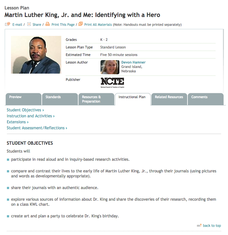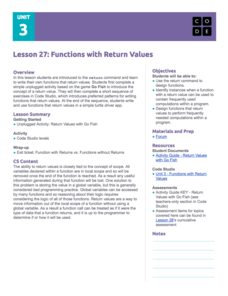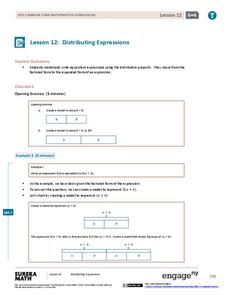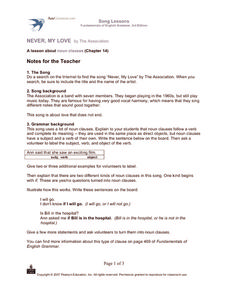Houghton Mifflin Harcourt
Around Town: Neighborhood and Community: English Language Development Lessons (Theme 3)
Here is a unit designed to support English language development. Scholars speak, move, and write to learn more about topics that focus on community and local concepts. The series of lessons aids to reinforce concepts including consonant...
Charleston School District
Scientific Notation and Appropriate Units
How do you write a number in scientific notation? The handout and video provide an explanation on how to convert from standard form into scientific notation and vice versa. The resource also contains a short discussion about choosing...
Museum of Tolerance
The Role of Citizens in a Participatory Democracy
Groups research participatory democracies and compare the role and rights of citizens in ancient history with those in recent U.S. history. Guided by a series of questions, individuals compose a persuasive essay in which they discuss the...
ReadWriteThink
Martin Luther King, Jr. and Me: Identifying with a Hero
Here, young historians compare their early lives to that of Dr. Martin Luther King Jr.'s. They listen to a read aloud of a story by Dr. King's sister, and then write in the provided reflective journal template. Lastly, they share their...
Code.org
Functions with Return Values
Young computer scientists explore how to use the return command in computer programing by playing Go Fish. They learn about functions that return values and then write a turtle driver app using the return function.
EngageNY
Distributing Expressions
You know how to factor expressions; now it's time to go the opposite way. Scholars learn to write algebraic expressions in expanded form using the distributive property. A problem set helps them practice the skill.
EngageNY
Read Expressions in Which Letters Stand for Numbers
Pencil in the resource on writing verbal phrases into your lesson plans. The 15th installment of a 36-part module has scholars write verbal phases for algebraic expressions. They complete a set of problems to solidify this skill.
Spreading Gratitude Rocks
A Note of Gratitude
Gertrude Stein once said, "Silent gratitude isn't much use to anyone." Learners break their silence by engaging in discussion and making lists of what makes them grateful. Next, pupils write and illustrate a thank you letter to a chosen...
Lafayette Parrish School System
Teaching Tone and Mood
Tone and Mood are not synonymous! Introduce young readers to these literary devices with a series of exercises that not only point out the significant differences between the terms but also shows them how to identify both the tone and...
EngageNY
End of Unit 2 Assessment: Final Literary Analysis
Get ready to review and revise! Scholars peer edit each other's literary analysis essay drafts. Next, using peer and teacher feedback, pupils compose their final drafts.
EngageNY
Presenting a Research-Based Claim: Effective Speaking Techniques
Take note. Scholars receive their claim drafts back to revise and write their claims and three pieces of evidence on notecards. They save the notecards to use when the verbally present their claims to the class. At the end, individuals...
Scholastic
Presenting Persuasively (Grades 6-8)
Teens and pre-teens are a prime target for advertisers, so how are they doing it? An interactive activity highlights the strategies used by advertisers, such as visual imagery and verbal clues. Then, a short writing assignment puts those...
Azar Grammar
Song Lessons: Never, My Love
Here's a clever way to introduce language learners to noun clauses. After a brief exercise that provides examples of different types of noun clauses, class members listen to the Association's "Never, My Love" and identify the clauses in...
Science Geek
Stoichiometry
Watch your class react when you tell them they're going to study stoichiometry! The lesson demonstrates four examples. Scholars must write and balance the chemical equation and then make the conversion to find the correct mass or volume....
Curated OER
Not Getting the News about the Stamp Act
How did American colonists react to the Stamp Act of 1765? Your young historians will examine primary source material by reading excerpts from a transcription of the Pennsylvania Gazette and then identifying the sentiments expressed by...
Pimsleur
Dining Out in Brazil
Learn about Brazilian food and pick up some Portuguese vocabulary along the way. After studying the vocabulary, class members complete the provided worksheets. They then work in pairs to write sentences and play a vocabulary game as a...
August House
The Magic Pot
The Magic Pot by Patricia Coombs is the theme of this multidisciplinary lesson plan. Early readers first take part in a read aloud and grand conversation about the story's details. Then, they get to work practicing their skills in...
Curated OER
Dulce et Decorum est by Wilfred Owen
It is entirely fitting and proper that Wilfred Owen’s powerful “Dulce et Decorum Est” is the poem used for an exercise in close reading, discussion, analysis, and argumentative writing. Class members discuss focus questions in pairs,...
Achieve The Core
Linda R. Monk, Words We Live By: Your Annotated Guide to the Constitution - Grade 8
“We the people . . .” Thus begins the Preamble to the Constitution. Using a close reading approach, class members examine an excerpt from Linda Monk’s article that traces how the interpretation of these words has evolved. Some of your...
Canadian Museum of Civilization Corporation
Artifacts Tell Stories: Creating a First World War Museum in the Classroom
Although designed for the Canadian War Museum, the concept here is a solid one. Class members select an artifact from the First World War, examine it, research it, and craft an explanative label that they attach to their picture and post...
iCivics
Emphasize Minimize
Encourage your class members to consider what points they are really emphasizing when they are making an argument, whether in writing or in speech. Watch out though, as this lesson may just leave your learners eager to debate you!
Art Institute of Chicago
African Myths and Stories
Young historians discover African stories associated with a royal altar tusk from the Kingdom of Benin in Nigeria, read myths illustrated on the tusk, and write a story about the life of an oba using figures depicted on the tusk.
K12 Reader
Pronoun Agreement: Spot the Error
Young grammarians locate pronoun agreement errors, in number, gender, and/or person, in a series of sentences, and then re-write the sentences correcting the errors.
Lerner Publishing
Meet the Dinosaurs
Take your class of youngsters on a prehistoric adventure with this four-lesson series on dinosaurs. Accompanying the Meet the Dinosaurs books by Don Lessem, these lessons engage children in writing their own dinosaur books, making...
Other popular searches
- Writers
- Freedom Writers
- Writers Workshop
- Freedom Writers Lesson Plan
- Writers Notebook
- Writers Craft
- Free Write
- Freedom Writers Movie
- Writers Craft Story Starters
- Natural History Writers
- Writer's Workshop
- How to Write a Paragraph

























